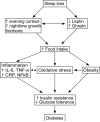Oxidative stress, insulin signaling, and diabetes
- PMID: 21163346
- PMCID: PMC3557825
- DOI: 10.1016/j.freeradbiomed.2010.12.006
Oxidative stress, insulin signaling, and diabetes
Abstract
Oxidative stress has been implicated as a contributor to both the onset and the progression of diabetes and its associated complications. Some of the consequences of an oxidative environment are the development of insulin resistance, β-cell dysfunction, impaired glucose tolerance, and mitochondrial dysfunction, which can lead ultimately to the diabetic disease state. Experimental and clinical data suggest an inverse association between insulin sensitivity and ROS levels. Oxidative stress can arise from a number of different sources, whether disease state or lifestyle, including episodes of ketosis, sleep restriction, and excessive nutrient intake. Oxidative stress activates a series of stress pathways involving a family of serine/threonine kinases, which in turn have a negative effect on insulin signaling. More experimental evidence is needed to pinpoint the mechanisms contributing to insulin resistance in both type 1 diabetics and nondiabetic individuals. Oxidative stress can be reduced by controlling hyperglycemia and calorie intake. Overall, this review outlines various mechanisms that lead to the development of oxidative stress. Intervention and therapy that alter or disrupt these mechanisms may serve to reduce the risk of insulin resistance and the development of diabetes.
Published by Elsevier Inc.
Figures
References
-
- Centers for Disease Control and Prevention . National diabetes fact sheet: general information and national estimates on diabetes in the United States, 2007. U.S. Department of Health and Human Services, Centers for Disease Control and Prevention; Atlanta, GA: 2008.
-
- International Diabetes Federation [July 06, 2010];Diabetes e-Atlas. 2006 Available at: http://www.eatlas.idf.org.
-
- Mehers KL, Gillespie KM. The genetic basis for type 1 diabetes. Br Med Bull. 2008;88:115–129. - PubMed
-
- Ahmad FK, Zhiheng H, King GL. Molecular Targets of Diabetic Cardiovascular Complications. Current Drug Targets. 2005;6:487–494. - PubMed
Publication types
MeSH terms
Substances
Grants and funding
LinkOut - more resources
Full Text Sources
Medical
Research Materials




